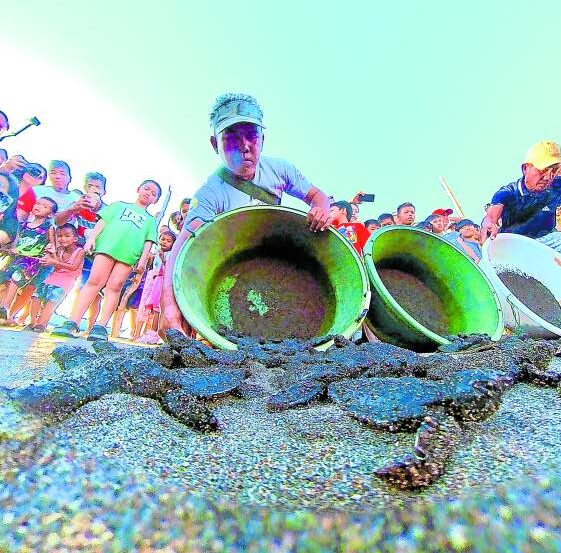Over 5,000 baby turtles released in Tayabas Bay

FIRST SURVIVAL TEST |Villagers in Sariaya, Quezon, gather on the beach to watch the release of turtle hatchlings and see them off as they crawl toward the water in Tayabas Bay on New Year’s Day. (Photo by DANNY ORDOÑEZ)
LUCENA CITY, Quezon, Philippines — More than 5,000 baby sea turtles have been returned to their natural habitat in Tayabas Bay beginning December last year, according to an environmental group.
Jay Lim, project officer of Tanggol Kalikasan (TK), said a total of 5,201 baby turtles have been released into the bay as of Jan. 5, as he noted the end of their nesting season by February.
The turtles, known locally as “pawikan,” were offspring of turtle species olive ridley (Lepidochelys olivacea), hawksbill (Eretmochelys imbricata), and green sea turtle (Chelonia mydas), which laid their eggs on the shores of Tayabas Bay sometime October to December.
Tayabas Bay stretches from San Juan town in Batangas province to Lucena City and the municipalities of Sariaya, Pagbilao, Padre Burgos, Agdangan, Unisan, Pitogo, Macalelon, General Luna, Catanauan, Mulanay and San Francisco in Quezon province. The bay’s coastline spans about 525 kilometers.
“The annual invasion of pawikan is most welcome. Laying their eggs along our shores is a natural gift,” Lim said in an interview on Friday.
Article continues after this advertisementAbout 4,000 of these turtles were released on separate occasions just last week.
Article continues after this advertisementREAD: Love of sea turtles turns Philippine poachers into protectors
READ: Iloilo kids help protect sea turtles
READ: In United Arab Emirates, struggling sea turtles get a helping hand
The Southern Tagalog District of the Philippine Coast Guard said 167 newborn olive ridleys were freed in San Juan on Dec. 31. On New Year’s Day, 382 olive ridleys were released in Sariaya, Lim said.
On Friday, 110 hawksbill turtles were freed in Catanauan; 60 green sea turtles in Agdangan; 87 green sea turtles in Pagbilao; and 127 olive ridleys in Lucena.
The biggest release that day was in Sariaya, where a total of 3,217 olive ridleys and green sea turtles were freed.
‘Protected space’
In Sariaya, baby turtles racing toward the bay before sunrise are a sight to behold for nature lovers, especially during the first three months of each year.
Local media, fishermen and their families, barangay officials, and even tourists from Metro Manila look forward to witnessing this spectacle of nature.
The coastal villages in this town, where many beach resorts and other enterprises are also located, have long been known as nesting sites.
But according to Lim, “The coastal areas of most municipalities along Tayabas Bay now have their own respective protected space for sea turtles where they can lay their eggs until they are hatched.”
“The pawikans no longer converge on the shores of Sariaya town. The long pristine shores of the bay are now their home,” he added.
Lim said the hatchlings are cared for in their nesting sites by fishermen and “fish wardens,” who call themselves “bantay dagat.”
Campaign
But sometimes these turtles are endangered by nature itself.
In October 2022, more than 600 turtle eggs waiting to be hatched were swept away by huge waves during the onslaught of Severe Tropical Storm “Paeng” (international name: Nalgae).
Sherwin Rosales, a fishery technician at the Sariaya agriculture office, said local officials built new nesting sites after the typhoon in safer areas along the coast.
Lim called on the local governments, fish wardens and villagers to continue to safeguard Tayabas Bay and its coastline.
“This annual phenomenon needs serious protection and preservation from all stakeholders,” he said.
Illegal fishing
He also urged the government to crack down on illegal fishing.
A study by TK has shown that numerous “baklad,” or huge stationary fish traps sunk into the bottom of the bay, pose a grave threat to the turtles.Lim cited past incidents of turtles beaching after breaking free from these traps.
He also pointed out TK’s information campaign in the coastal villages to promote environmental laws and wildlife protection, saying this has discouraged the practice of keeping turtles as pets or consuming their meat and eggs.
Sea turtles are classified as an endangered species by Switzerland-based environmental authority International Union for Conservation of Nature.
Their protection here is provided by Republic Act No. 9147, or the Wildlife Resources Conservation and Protection Act, enacted in 2001.